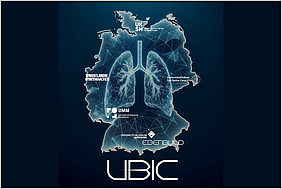As part of the research project "Personalized Lung Twins for the Treatment of Acute Respiratory Distress Syndrome" (UBIC), the Munich-based start-up Ebenbuild and other partners have received up to 1.8 million euros in funding from the Federal Ministry of Education and Research (BMBF).
Ebenbuild develops personalized lung simulation models based on patient-specific data. These so-called digital lung twins are used to improve the treatment outcomes of intensive care patients who are artificially ventilated and suffer from acute respiratory distress syndrome, or ARDS for short. ARDS is a life-threatening complication with many causes such as trauma, sepsis or severe illnesses, e.g. COVID-19. The leakage of fluid into the lungs makes breathing difficult and prevents oxygen from entering the body.
Appropriate treatment is essential, but the relevant expertise is usually only available in specialized centers and therapy is extremely time-consuming. Despite advances in diagnosis and intensive care treatment, ARDS is still under-recognized and therefore under-treated, which is a major problem worldwide. As a result, around 40 percent of ARDS patients die. Since the start of the Covid pandemic, these figures have risen even further, with over 80 percent of deaths following Covid infection attributable to ARDS.
As part of the UBIC consortium, Ebenbuild will receive up to 900,000 euros from the BMBF for the development of novel AI and simulation technologies for modeling and researching heterogeneously damaged lungs and for improving digitally supported decision-making in intensive care medicine. The project is being carried out in close cooperation with the University Hospital Schleswig-Holstein (UKSH), the University Hospital Mannheim, the University Hospital Aachen, the University Hospital Augsburg and the University Hospital Carl Gustav Carus Dresden.
Dr. Kei Müller, CEO and co-founder of Ebenbuild, emphasized the importance of participating in the project and the funding. He sees this as a crucial step towards Ebenbuild's goal of providing advanced decision support to clinicians worldwide. "Our digital lung twin offers unprecedented medical support by replicating an individual lung. This allows doctors to evaluate different treatment options under real-life conditions, improve ventilation quality and ultimately save patients' lives," says Müller.
Ebenbuild intends to use the funding to further develop its innovative AI and simulation technologies in order to model heterogeneously damaged lungs and improve digitally supported decision-making in intensive care medicine. In addition, the start-up plans to work with clinical partners to collect and evaluate patient data in a large multicenter study.

